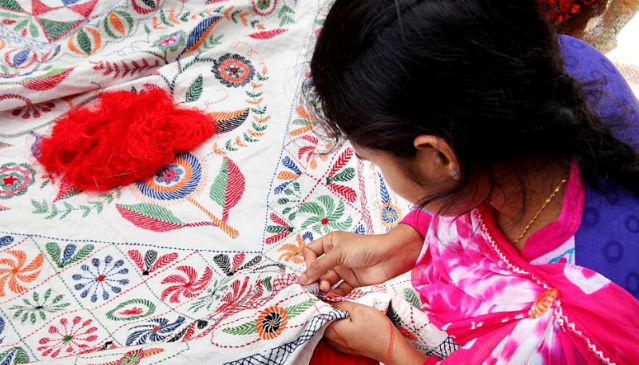Women’s entrepreneurship is thriving in Bangladesh, but many face significant hurdles on their path to success. Lack of mentorship and training has been identified as a major barrier to women’s leadership abilities in various fields.
Despite government efforts to empower women, including efforts by the Small Business Foundation, the stark reality remains. Only 7.23 percent of Bangladesh’s 8 million businesses are led by women.
Most of these businesses operate informally and serve both local and export markets. Stakeholders recognize the need for intervention and advocate for comprehensive measures that address the root causes of gender disparities in entrepreneurship.
Key areas of focus include access to markets and credit, institutional support from ministries, women’s organizations and chambers of commerce, and most importantly, mentorship and training programs tailored to women entrepreneurs.
This year, three of the seven entrepreneurs receiving SME Foundation awards are women, demonstrating the special role that women entrepreneurs have in building a developing Bangladesh.
Sapna Rani Sen of Rangpur Crafts, one of the winners, told Business Post: I work with shataranji and jute. But my main problem is the lack of raw materials and too high prices.
“The price of yarn was Tk 40 per kg in 2008, but now it has risen to Tk 350 per kg. But we have not increased the price of our product like that. This yarn is not available in Rampur. We have to collect it from Narayanganj, which is very difficult for us as women.”
She continued, “Some people buy from us at a lower price and sell our products online at a higher price. They earn Tk 400 for an item whose original price is Tk 40. This is unfair.”
“It is very good that the Small and Medium Enterprises Foundation is working in Rangpur to promote Shataranji through clusters. I request the government to look into this issue.”
Additionally, women entrepreneurs faced many challenges, including financial hardship, harassment when obtaining licenses, and juggling home and business responsibilities.
Taslima Mizzi, another winner and owner of the leather brand Gootipa, said: Apart from financial problems, we have to face many other problems.
“For example, we have to face harassment in obtaining licenses from various sources. On top of that, women have to do both outside the home. Also in the field of lending. There are fewer opportunities for women than for men.”
She further added, “The Small and Medium Enterprises Foundation is the most active among government agencies. Every month, various training workshops are held and both women and men get job opportunities. I also received training here. “But it was a good decision,” he added.
Another award winner, Shima Sanami, owner of Shima General Hospital and Diagnostic Center, said: It’s an act of service. Everyone comes here sick and we serve them at affordable rates.
“But the problem is that some local residents come and leave without paying, so we can’t say anything even if we want to.”
She further added, “Moreover, there is a significant shortage of skilled medical assistants. Training was previously available through technical education, which is now obsolete. We are seeing more opportunities in this field.” I hope.”
Speaking at a seminar hosted by the Small and Medium Enterprises Foundation on Tuesday, Zakia Sultana, Senior Secretary of the Ministry of Industry, said: “Prime Minister Sheikh Hasina is also working towards women empowerment.
“It is because of her charismatic leadership that the country has become the digital Bangladesh it is today and is moving towards becoming a smart Bangladesh.”
She further added, “The Small and Medium Enterprise Foundation is doing a lot of work for women. We will work together to promote women’s success and develop female entrepreneurs. Must be.
“In that case, they should be trained to improve their skills. Intellectual property rights should be secured.”
In response to these challenges, there is a need to establish mentorship programs and provide training opportunities to enhance the skills and leadership abilities of women entrepreneurs.
Ensuring the protection of intellectual property rights is further emerging as an important aspect of women’s empowerment in the business world.
Fostering an ecosystem that nurtures and supports women entrepreneurs is essential as Bangladesh strives for inclusive economic growth.
Through the collaborative efforts of government agencies, development organizations, and the private sector, we can transform the landscape for women entrepreneurs and pave the way for a more just and prosperous future.

